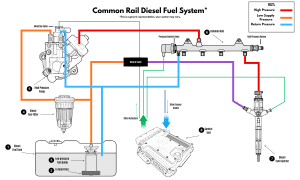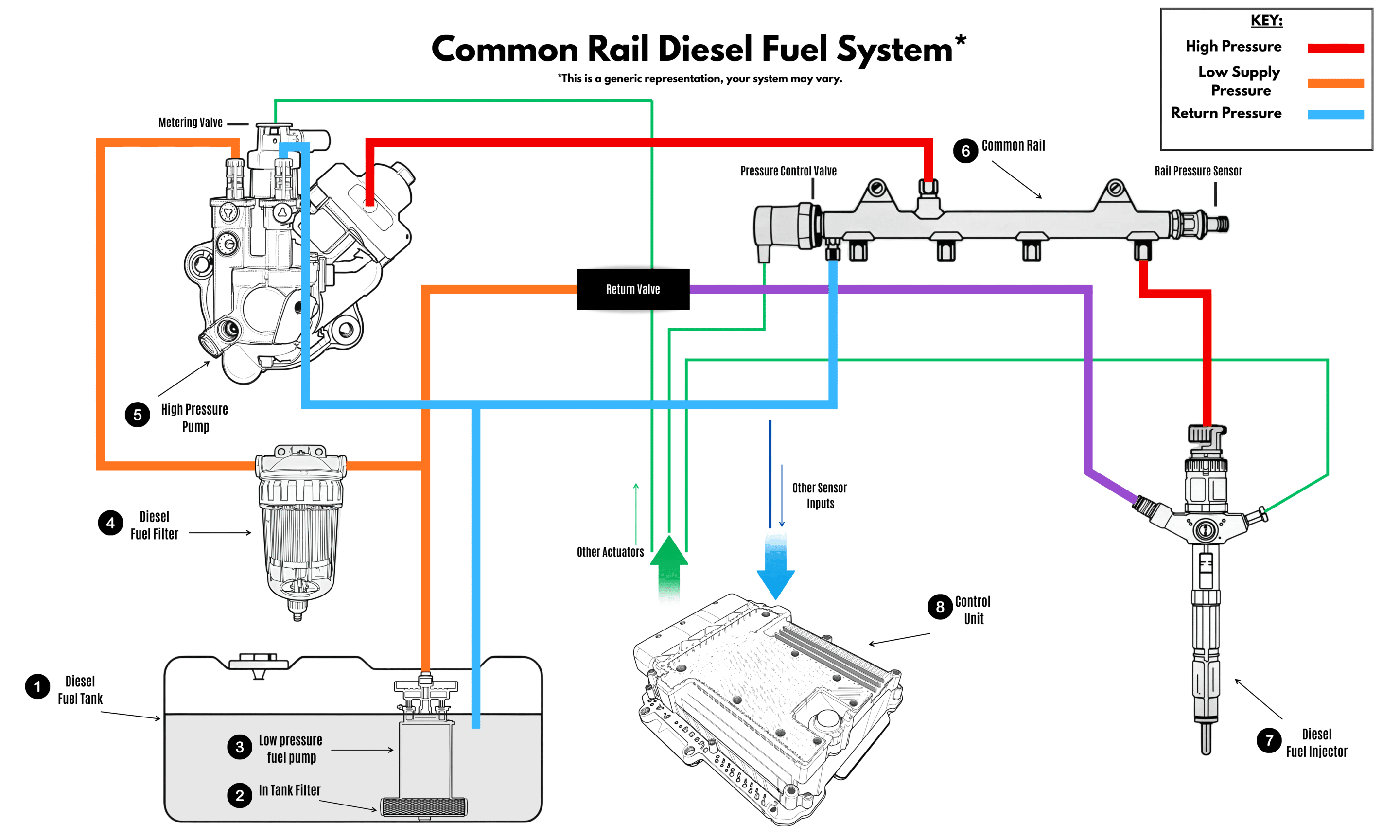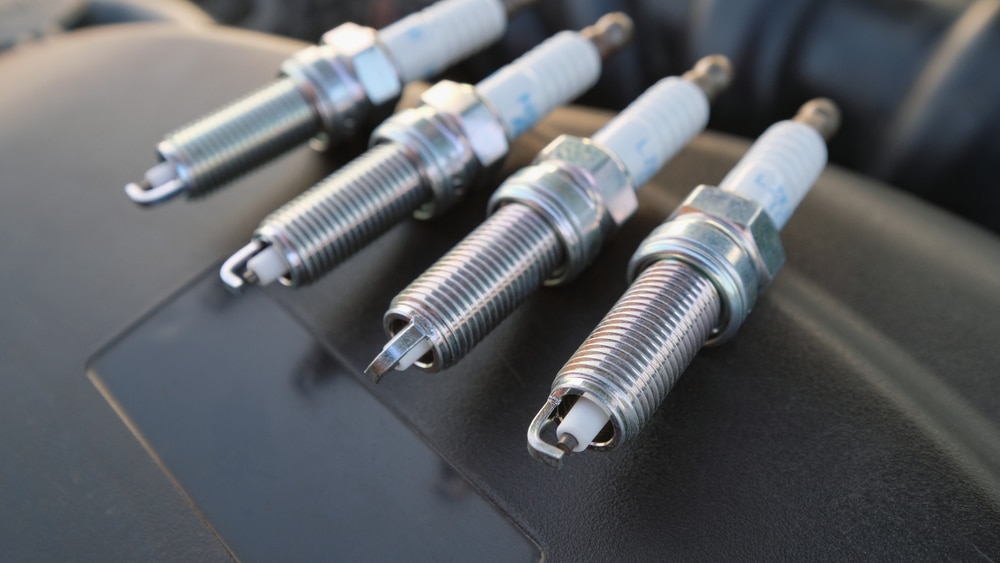Diesel Fuel System Guide
A problem with your diesel fuel system can quickly turn costly.
That’s because it carries out one of the most important jobs in your vehicle: moving fuel to the engine so combustion can take place. Without it, your car simply wouldn’t run.
Modern diesel fuel systems are built with advanced engineering, ensuring a dependable mix of performance, efficiency, and reliability.
Here’s the risk.
Because the system operates at extreme pressure, even small mistakes like neglecting a diesel filter replacement or misfuelling with petrol can have expensive consequences.
Throughout this article, you’ll reveal how the diesel fuel system operates, what can happen if it’s overlooked, and why regular maintenance is key to avoiding high repair bills.
Don’t put off your diesel fuel system service – call Standish Service Station in Wigan today on 01257 422899 to book your slot.
How the Diesel Fuel System Works in Detail
While there are different designs of diesel fuel systems, most modern engines are equipped with a common rail diesel fuel system.
While there are many different variations of the common rail design, the underlying principle is the same: a high-pressure rail stores fuel and supplies it evenly to every injector, ensuring accuracy and reliability.
This common rail diesel fuel system is divided into two sides:
- Low-pressure side: The pump pulls fuel from the tank, routes it through filters to remove harmful particles and water, and delivers it to the high-pressure pump at the right supply pressure.
- High-pressure side: The high-pressure pump then raises the pressure significantly (around 1800 Bar) and supplies the rail. The rail then keeps the diesel stable under pressure until the injectors atomise it into the cylinders as a fine mist for combustion.
Put simply, the diesel fuel system ensures that clean, high-pressure diesel consistently reaches the cylinders so the engine can run as expected.
Examining the Diesel Fuel System Up Close
Having covered the wider process, we can now take a closer look at the individual elements of the diesel fuel system. Each component plays a vital role, and together they provide the reliability and performance drivers expect.

Diesel Fuel System: The Low-Pressure Operation
Fuel Tank & Low-Pressure Fuel Pump
The entire process begins in the diesel fuel tank (see part 1 of image). From there, a low-pressure pump (see part 3 of image) supplies the diesel to the high-pressure side, ensuring a constant and reliable flow.
Diesel Fuel Filter
Before the diesel supply moves further, it’s cleaned by filters (see parts 2 and 4 of image). These filters capture tiny pieces of dirt and remove naturally present water, helping protect vital components from expensive wear and corrosion.
High-Pressure System
High-Pressure Pump
After filtration, the diesel enters the high-pressure pump (see part 5 of image). Its job is to raise pressure to roughly 1800 Bar, preparing the diesel for injection.
Metering and Pressure Control Valves
During the process, two valves keep things precise:
- The metering valve decides how much fuel reaches the high-pressure side.
- The pressure control valve ensures the rail maintains optimum levels for smooth operation.
Fuel Rail
You can think of the diesel fuel rail (see part 6 of image) as a high-pressure store, keeping diesel stable and distributing it equally to each injector.
Diesel Injectors
Finally, the injectors (see part 7 of image) deliver the fuel. With minute holes in the nozzle around the size of a human hair, they atomise the diesel into a fine mist at the exact moment it’s required for combustion.
Why the Diesel Fuel System Is Unique and Important
While your vehicle’s fuel system may look like nothing more than a series of pipes, pumps, and filters, it’s one of the most advanced parts. Its design allows it to manage fuel with incredible accuracy.
Some of the features that make it special include:
- Delivery with precision: Combining low-pressure and very high-pressure stages, the system can inject the right amount of diesel in fractions of a second. This ensures fuel is burned efficiently.
- Exacting design: Every part, from pumps and filters to the injectors, works with accuracy to deliver smoother combustion, reliable power, and improved efficiency.
- Susceptibility to contamination: Because of this precision, even slight amounts of water or dirt can cause wear or corrosion. Keeping filters replaced on schedule and using quality diesel are essential preventative measures.
If you regularly maintain your diesel fuel system, it’s more likely to continue working seamlessly in the background. But, left unchecked, small issues can lead to repairs no driver wants to face.
Neglecting the Diesel Fuel System: What to Expect
Since the diesel fuel system works with extreme pressure and precision, neglecting maintenance can quickly cause severe problems. Sometimes, this results in a hefty repair bill, which is the last thing anyone wants.
The most common include:
- Neglecting filter replacements: Filters protect the system by trapping dirt and removing water. If ignored, contaminants move into the pumps and injectors, causing wear and corrosion.
- Poor fuel quality: Lower-grade diesel often contains water and impurities, which speed up corrosion inside the high-pressure pump, rail, and injectors.
- Spread of contamination: Once dirt or water enters, it circulates through the whole system. Replacing single parts won’t solve the issue if the underlying contamination remains.
Compared to repairing a damaged fuel system, replacing a filter is inexpensive, so we can’t state how important it is NOT to skip your vehicle’s servicing.
Another concern to be aware of is misfuelling your car with petrol. Petrol lacks the lubrication diesel provides, and even running the engine for a split second after filling with petrol can cause major harm to injectors and the high-pressure pump.
If it happens, the best action is simple: do not start the engine and call a professional straight away.
Protecting Your Diesel Fuel System Long-Term
Your diesel fuel system plays a crucial role in your vehicle’s performance. When maintained, it runs smoothly in the background. But if neglected or filled with the wrong fuel, the outcome can be sudden failures and costly repair work.
Protecting the system doesn’t require anything complicated. Simply doing the following will help to keep your diesel fuel system in peak condition:
- Following your vehicle’s handbook
- Replacing fuel filters when advised
- Choosing high-quality diesel
Regular servicing today can safeguard against bigger, more expensive problems further down the line.
Why Drivers Choose Standish Service Station, Wigan
For dependable diesel servicing, local drivers look to Standish Service Station. Here are just a few reasons why motorists in Wigan and Bolton put their trust in us:
- Trusted local garage serving drivers in Standish, Wigan, and Bolton
- Comprehensive diesel servicing and repair expertise
- 12-month guarantee on parts and labour for extra peace of mind
- A courtesy car option is available to keep you moving during your service
Our garage is proud to have a {{average-rating}}⭐ Google rating from {{review-count}} satisfied customers in Wigan. Book your diesel service at Standish Service Station with confidence.
To keep your diesel system in excellent shape, book a service with Standish Service Station in Wigan. Call 01257 422899 to secure your slot.
FAQ: Diesel Fuel System
- How does a diesel fuel system work?
While there are variations, most modern diesels use a common rail system. Fuel moves from the tank at low pressure through pumps and filters to the high-pressure pump. There, it’s compressed before being stored under pressure in the common rail. The injectors then atomise the fuel into the cylinders at the correct time to allow combustion. - Why does the diesel fuel system need servicing?
Since the diesel fuel system operates with incredible precision, even small amounts of water or dirt can cause serious issues. Replacing fuel filters on time protects against this. Servicing keeps pumps and injectors in good condition and prevents breakdowns that would otherwise cost far more to repair. - What are the main causes of system damage?
The most common problems come from delaying filter changes, using poor-quality diesel, water contamination, or misfuelling with petrol. Contaminants spread through the entire system, causing ongoing issues unless fully addressed. - What happens if petrol goes in the tank?
Petrol doesn’t provide lubrication. If it’s added by mistake, the high-pressure pump and injectors can be damaged quickly. Even starting the engine for a moment can send petrol through the system. The safest action is to avoid turning the key and arrange professional drainage immediately. - How much does it cost to repair?
The price depends on the type of fault and how severe it is. A filter change is low cost, but repairs to pumps or injectors can be significantly more expensive. Preventative servicing is always the better choice.
Not sure when your diesel fuel system was last checked? Contact Standish Service Station in Wigan on 01257 422899 and let our experts help.



